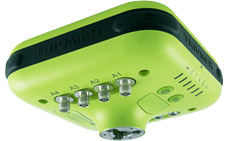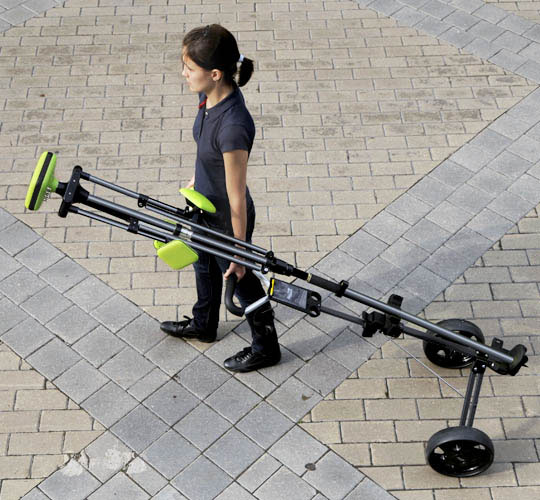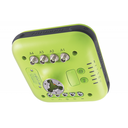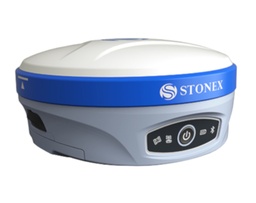JAVAD TRIUMPH-4X GNSS Receiver
Conventional RTK uses one base and one rover yielding only one baseline with no checks and balances. Surveyors appreciate the power of networks, where many points and repeated measurements along with network adjustment remove outliers and give more accurate results.
To improve the reliability of RTK, some users employ data from more than one base. Multiple bases are rare and not conveniently available.
In a giant step forward along with introducing TRIUMPH-4X, we also introduce Cluster RTK, or 4x4 RTK, where sixteen baselines are processed in every single RTK measurement.
For the first time in the history of GNSS, the power of survey techniques and network adjustments comes to RTK but without the burdens and complications. The operation is similar to conventional RTK. Surveyors and geodesists can now trust RTK measurements while improving accuracy, reliability and availability.
Now when we say 20 Hz RTK, we mean measuring 16 baselines of 8 points and performing equivalent of geodetic network adjustment on 16 baselines, removing outliers and providing reliable geodetic quality RTK solutions 20 times per second!
4x4 cluster RTK does not need a truck load of expensive equipment, multiple field operators, and complicated procedures. It is even simpler than conventional 1x1 RTK because you even do not need to level your pole!
Triumph-4x
TRIUMPH-4X is equivalent of 4 independent TRIUMPH-1 receivers packaged in the same small box. Furthermore, these 4 independent receivers are operating synchronously using the same local oscillator. A central processor coordinates internal activities of these four receivers as well as communications and data transmission with outside. And all is done with a single TRIUMPH Chip inside. This is why it is neither heavy nor expensive.
One TRIUMPH-4X base and one rover results in a 16-baseline RTK system. While systematic and correlated errors can be removed in single RTK systems, the uncorrelated errors degrade the RTK accuracy. In TRIUMPH 4x4 systems the uncorrelated (random) errors are reduced significantly. This improved accuracy and reliability is especially important in critical applications like machine control.









![[J-Ant-Tr2-1] JAVAD TRIUMPH-2 GNSS Receiver (Base)](/web/image/product.product/2797/image_256/%5BJ-Ant-Tr2-1%5D%20JAVAD%20TRIUMPH-2%20GNSS%20Receiver%20%20%28Base%29?unique=a4dd3aa)
![[J-Ant-TLS-1] JAVAD TRIUMPH-LS GNSS Receiver (Base)](/web/image/product.product/3029/image_256/%5BJ-Ant-TLS-1%5D%20JAVAD%20TRIUMPH-LS%20%20GNSS%20Receiver%20%20%28Base%29?unique=50157af)
![[56208] Pentax G6 GNSS receiver (Ni)](/web/image/product.product/3581/image_256/%5B56208%5D%20Pentax%20G6%20GNSS%20receiver%20%20%28Ni%29?unique=93fd39a)
![[104234-00] Spectra Precision SP60 GNSS receiver (L1 GPS)](/web/image/product.product/663/image_256/%5B104234-00%5D%20Spectra%20Precision%20%20SP60%20GNSS%20receiver%20%20%28L1%20GPS%29?unique=5bc276a)
![[94334-10] Spectra Precision SP80 GNSS receiver (With UHF 430-470 MHz 2w TRx and Survey Office intermediate)](/web/image/product.product/1238/image_256/%5B%E2%80%8E94334-10%5D%20Spectra%20Precision%20SP80%20GNSS%20receiver%20%20%28With%20UHF%20430-470%20MHz%202w%20TRx%20and%20Survey%20Office%20intermediate%29?unique=4e33ed3)
![[119786-00] Spectra-Precision SP85 GNSS receiver (SP85 GNSS Single Receiver Kit)](/web/image/product.product/3390/image_256/%5B119786-00%5D%20Spectra-Precision%20SP85%20GNSS%20receiver%20%20%28SP85%20GNSS%20Single%20Receiver%20Kit%29?unique=f0f704a)
